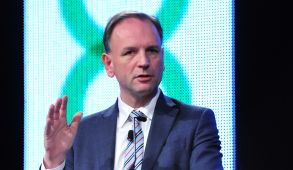Brexit NHS funding promise should be honoured, says Stevens

Picking up on this, Mr Stevens (pictured) told the NHS Providers’ annual conference in Birmingham: ‘The NHS wasn’t on the ballot paper in the Brexit referendum, but it was on the battle bus.’
The NHS was driving efficiencies hard through transformation programmes such as RightCare, the model hospital and Getting it right first time. The additional 280,000 operations identified by an unpublished NHS Improvement report on theatre productivity were performed for no additional payment, he said. But with planned funding increases set to decline in the next two years, patient care would suffer without additional funding, he added.
‘The budget for the NHS next year is well short of what is currently needed to look after our patients and their families at their time of greatest need. After seven years of understandable but unprecedented constraint, on the current budget outlook the NHS can no longer do everything that is being asked of it.'
The NHS England analysis of the funding position showed that trusts are likely to be ‘retrenching and retreating’ rather than hiring additional frontline staff; it will be difficult to expand mental health services; and waiting lists could grow by 1 million to 5 million by 2021.
He dismissed suggestions that his speech was political or a criticism of the £350m claim. He saw it as an opportunity. ‘During the campaign a promise was made to the British people – in exchange for Brexit there was the possibility to have a better-funded NHS. All I am saying is that was a good promise to make and now is a good time to begin to deliver it.’
The £350m figure is controversial. While the gross payment to the European Union is around that amount, it does not take into account of the rebate from the EU.
Mr Stevens said 69 years ago, the country was coming out of the war, its economy was in disarray, it was negotiating its place in the world and there was a need for a massive house-building programme. Despite this, it took the bold step of setting up the NHS – faced with similar challenges today, it was time to once again take decisive action, he said.
Mr Stevens’ intervention comes two weeks ahead of the Budget and on the day the King’s Fund, Nuffield Trust and Health Foundation published a report calling for the NHS to be given an extra £4bn in 2018/19. The joint Budget statement said patient care and waiting times were being adversely affected by austerity and rising demand. Under current plans, health spending in England will rise from almost £124bn in 2017/18 to an estimated £128bn by 2022/23, they said. However, based on Office for Budget Responsibility projections, they estimated spending will need to rise to around £153bn by 2022/23. If the current plans were delivered, spending would fall short by more than £20bn by 2022/23.
They added that the slowing of NHS funding increases in 2018/19 to 0.4% – which meant a fall in health spending per person – was £4bn less than needed.
Chris Ham, King’s Fund chief executive, said: ‘After seven years of austerity, the dramatic improvements made in healthcare over the past 20 years are at risk of slipping away. The message is clear – unless the government finds the money the NHS and social care need, patients, service users and their families will suffer the consequences.’
Nigel Edwards, chief executive of the Nuffield Trust, said: ‘Despite having become ever more efficient, the NHS faces a huge underlying financial gap set to grow every year unless something changes. The problem simply isn’t going to go away with one-off bungs or bailouts and is driving hospitals into deficit and causing patients to wait longer and longer for treatment. The government must face facts and commit to sustainable increases over the lifetime of this Parliament.’
Health Foundation chief executive Jennifer Dixon said: ‘Without proper investment now, the NHS will slip well below the standards and outcomes of healthcare provided by our European neighbours. This is entirely avoidable. An extra £4bn in 2018/19 would simply be a return to the average increases of the first 63 years of the NHS’s history. The additional funding required is not exceptional, it is the past seven years of austerity that are the exception.’
NHS Providers also called on the chancellor to find additional funds for the NHS. Its Budget submission said that recovering the NHS Constitution standards would require new money and any money for this Parliament is frontloaded in the next two years. Capital funding commitments should be honoured and the additional costs from the likely end of pay restraint must also be funded, it said.
Providers’ chief executive Chris Hopson added: ‘There isn’t enough funding to cope with rising demand and meet performance targets but it’s yet to be widely accepted that the targets are undeliverable without the extra funding. This risks eroding public confidence in the NHS but also putting trusts and frontline staff in a position of inevitably failing, however hard they try.’
He continued: ‘Any commitments must be properly costed, fully assured and agreed with the frontline leaders who will be accountable for delivering what is promised.’
Related content
We are excited to bring you a fun packed Eastern Branch Conference in 2025 over three days.
This event is for those that will benefit from an overview of costing in the NHS or those new to costing and will cover why we cost and the processes.